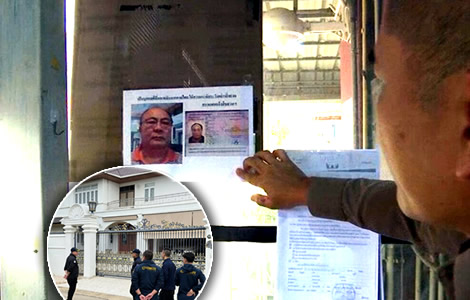Thai police hunt Kok An, Cambodia’s “Godfather of Poipet,” in a billion-baht fraud ring linked to Hun Sen. Raids, arrest warrants and a leaked call with Thailand’s PM spark political turmoil as cross-border cyber scams trigger national security concerns.
Thai authorities are closing in on a powerful Cambodian senator, dubbed the “Godfather of Poipet,” after issuing an arrest warrant and raiding his properties in three provinces this week. The dramatic crackdown is part of a broader move by Thailand’s Cybercrime Agency, which is weighing criminal charges against Cambodia’s iron-fisted leader, Hun Sen. It follows the explosive leak of a June 15 phone call between Hun Sen and suspended Thai Prime Minister Paetongtarn Shinawatra — a call that has rocked Thai politics.

Police say the fugitive senator, a close ally of Hun Sen, is deeply tied to a transnational crime ring that has cost Thai citizens hundreds of millions of baht. Investigators believe he played a central role in scams run out of Cambodia, targeting victims across Thailand.
Tensions between the Pheu Thai-led Thai government and Cambodian strongman Hun Sen are escalating rapidly. The fallout is now spilling into a transnational crackdown on organised crime along the Thai-Cambodian border. At the heart of the controversy is Kok An, a Cambodian senator and powerful businessman known as the “Godfather of Poipet.”
Earlier this week, Thai authorities intensified efforts to bring Kok An to justice. On July 7, 2025, the Thai Criminal Court issued an arrest warrant No. 3924/2568. The warrant charges him with participating in a transnational criminal organisation. This marked a major escalation in cross-border law enforcement.
Kok An used luxury Poipet properties, including casinos, as operational bases for large-scale online fraud
Kok An, 71, owns several high-rise buildings and casinos in Poipet. These include, for instance, the Crown Casino, the 25-storey HISO building, and an 18-storey tower. According to investigators, these sites were used as operation centres for online fraud and call centre scams.
Thai police say these scams caused billions of baht in damages. Victims were tricked into fake investments, phishing schemes and hybrid scams. Many were contacted by fraudsters posing as government officials. Some were even lured across the border with fake job offers.
Consequently, Thai authorities launched a nationwide manhunt. On July 8, the Technology Crime Suppression Division (TCSD) conducted a massive operation. Officers searched 19 locations in Bangkok, Samut Prakan and Chonburi.
The operation was called “Close the Mule Account Building, Hunt the Cambodian Capitalists.” It involved joint forces from the Cyber Police and Immigration Bureau. Pol. Lt. Gen. Trirong Phiwpaen led the operation, with support from top division commanders.
Raids in three provinces target luxury homes tied to Kok An and his daughter Cherry Klongkitkon
Raids were executed simultaneously at four sites in Bangkok, fourteen in Samut Prakan, and one in Chonburi. Additionally, these locations were connected to Kok An and his criminal network. Many of the buildings were luxury properties recently purchased or leased.
One key target was a luxury home in Bangkok’s Prawet District. The two-storey house, worth over ฿30 million, is owned by Kok An and his daughter, Ms. Juri “Cherry” Klongkitkon, 42. The house was unoccupied at the time of the search.
Nevertheless, a caretaker granted police access to the property. Inside, investigators found documents, family photos, and high-end items. Officers also discovered ฿27 million in Ms. Juri’s bank accounts. Brand-name bags, luxury cars and valuable household items were seized.
Moreover, Ms. Juri was found to be holding a Thai national ID card. Authorities are now investigating its legitimacy. Therefore, they will determine whether the ID was obtained through legal means or under false pretences.
Thai women arrested for aiding mule account setup and verifying transactions with facial recognition
Simultaneously, arrest warrants were issued for two Thai women. They allegedly helped open mule bank accounts and also facilitated facial scans for financial transactions. These arrests therefore point to domestic complicity in the criminal network.
The investigation revealed that the buildings in Poipet were central to the fraud operation. Moreover, these sites housed hybrid scam call centres and money laundering hubs. Thai citizens were used as mules to open accounts and process transactions.
Often, victims were coerced into scanning their faces to verify transfers. Some were even held against their will. According to police, many did not realise they were aiding in criminal activity until it was too late.
In response, Sa Kaeo Immigration officials posted Kok An’s arrest warrant at the Ban Khlong Luek border checkpoint. His mugshot has since been circulated to police officers across the region. Authorities are preparing to request an Interpol Red Notice.
Thailand builds legal case against Hun Sen while facing limited support from Cambodian authorities
Despite limited cooperation from Cambodian authorities, Thai officials remain determined. They aim to capture Kok An and dismantle the entire criminal organisation. Security has been tightened at all major border crossings.
Meanwhile, Thai authorities are also building a legal case against Hun Sen. On July 10, the Central Investigation Bureau and Cyber Crime Bureau officially announced their intent to seek charges. This follows the leak of a private audio conversation between Hun Sen and Thai Prime Minister Paetongtarn Shinawatra.
The call, recorded on June 15, has already led to Paetongtarn’s suspension. Moreover, investigators believe Hun Sen released the audio to gain political leverage. If confirmed, this could violate Thai national security laws.
Additionally, arrest warrants were issued for Cambodian hackers. These individuals allegedly attacked Thai government websites. The cyberattacks were seen as retaliation for Thai actions along the border.
Crackdown expands from 2024 investigations into scams causing billions in losses across multiple sectors
The crackdown is part of a broader investigation that began in 2024. That year, cyber police started tracking scam operations targeting Thai citizens. Multiple high-profile fraud cases were uncovered during this period.
For example, the Phuri Casino case resulted in over ฿300 million in losses. Additionally, another victim, a doctor from Chiang Rai, lost more than ฿30 million. These incidents spurred deeper probes into transnational fraud rings.
Police say the group behind these scams is a complex criminal organisation. It includes individuals of various nationalities. Furthermore, duties were divided among finance managers, IT experts, recruiters, and transporters.
Importantly, the operation was not politically motivated. Therefore, Pol. Lt. Gen. Trirong stated that the goal is to prosecute all those who support or profit from organised fraud. The crackdown is focused on ending the call centre scam epidemic.
Over ฿500 million in assets seized as police continue examining evidence and linking key suspects
To date, all 19 raided properties have been seized. The total value of seized assets now exceeds ฿500 million, excluding land. Investigations into the property owners and tenants are still underway.
Authorities have not yet filed charges against all suspects. However, they have confirmed clear links between Kok An’s network and each searched location. The evidence includes digital records, witness testimonies, and bank transactions.
Furthermore, further raids may follow. Police are now analysing seized materials and cross-referencing with known scam reports. Additional arrests are expected.
Thai government sees crackdown as vital step in defending democracy and hitting foreign-backed crime
The government views this as a critical moment. Thailand has suffered significant financial and social harm from these cross-border scams. Citizens are demanding justice and stronger prevention measures.
Thaksin stoutly defends Prime Minister Ung Ing and blames the 2017 Constitution for thwarting progress
Hun Sen’s mask falls. Speech on Friday clearly showed deliberate ill will to collapse Thailand’s democracy
As the investigation widens, officials continue to monitor border points closely. The Promod Gate and smaller checkpoints remain open for limited traffic. However, surveillance has increased significantly.
Certainly, Thailand’s crackdown signals a new chapter in its fight against transnational crime. While political tensions with Cambodia may deepen, the priority remains clear. Authorities right now aim to protect Thai citizens and uphold the rule of law, regardless of external pressure.


















